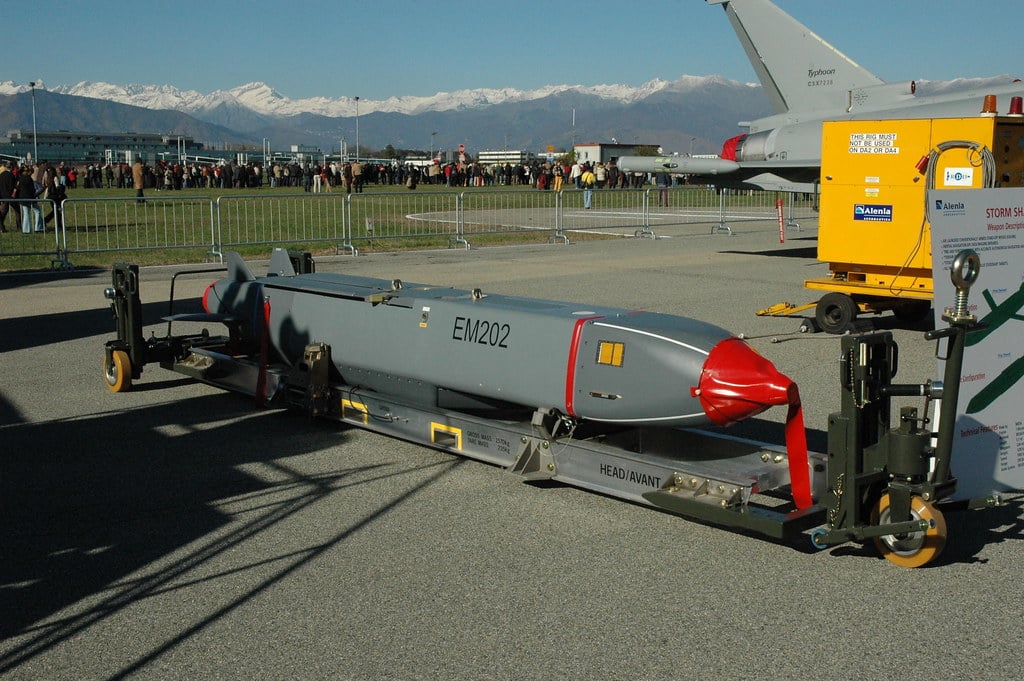It’s a pattern Ukrainian officials have commented on before: be patient. The West says no to more advanced weapons and then comes around to sending them. It happened with HIMARS rocket systems, tanks, and fighter jets.
The pattern seems to have been repeated again. After the West consistently rebuffed requests for longer-range missiles, on May 11 British Defense Secretary Ben Wallace revealed that long-range Storm Shadow cruise missiles “are now going into or are in” Ukraine. The United Kingdom’s decision to provide Ukraine with the long-range missiles was made with the knowledge of the United States who was, Wallace said, “incredibly supportive.”
Kremlin spokesperson Dmitry Peskov has responded, “This will require an adequate response from our military, who…will make appropriate decisions.”
Storm Shadow missiles are jointly developed by the UK and France at a cost of $2.5 million each. With a range in excess of 155 miles, they have the capacity to reach much deeper into Russian held territory than the already supplied HIMARS rocket systems that were modified to be capped at around 50 miles.
With the range provided by the new Storm Shadow missiles, Ukraine has the capacity to strike inside Crimea. Western officials have said that the new missiles could even give the capacity to strike “deep inside Russia’s internationally recognized borders.”
Russian Ambassador to the UK Andrey Kelin said, “It’s obvious for us that London made this step to enable Kiev to strike Russian cities and villages, including the territory of Crimea.”
And by the very next day, they had. On May 12, Russia claimed that Ukraine had fired two Storm Shadow cruise missiles at the city of Luhansk. According to the Russian defense ministry, two civilian industrial sites were struck. The defense ministry says that the two Ukrainian planes used to launch the missiles were shot down.
The Wall Street Journal reported that the Luhansk strikes were “70 miles from the nearest Ukrainian positions.” That is well “outside the range of Ukrainian artillery and U.S.-supplied Himars missile systems,” supporting the Russian claim.
Russia has commented before that they know it is the United States that provides Ukraine with targeting information. In February, “Ukrainian officials said they require coordinates provided or confirmed by the United States and its allies for the vast majority of strikes using its advanced U.S.-provided rocket systems.” According to a “senior Ukrainian official…Ukrainian forces almost never launch the advanced weapons without specific coordinates provided by U.S. military personnel.”
Storm Shadow missiles can strike deep inside Russian held territory in eastern Ukraine, in Crimea, and even into Russia. Wallace “stressed that ‘the use of Storm Shadow will allow Ukraine to push back Russian forces based within Ukrainian sovereign territory.'” The UK has reportedly “received assurances from the Ukrainian government that these missiles will be used only within Ukrainian sovereign territory and not inside Russia.”
However, those prefabricated assurances are not very reassuring, coming only a week after Russia claimed that Ukraine attempted a drone strike on the Kremlin. If true, the attempted strike demonstrates a willingness by Kiev to strike deep within the heart of Moscow. That attempt on the Kremlin follows “a string of drone attacks deep inside Russia,” including an attack on a military training ground on May 10, an oil refinery on May 4 and 5, and two attacks on Russia’s Engels air base in December.
Though offering public promises that long range missiles supplied by the West will not be used on targets inside Russia, comments by Ukrainian President Volodymyr Zelensky captured by electronic eavesdropping suggest that the private plans do not match the public promises. In February, Zelensky was heard to complain to General Valery Zaluzhny, his top commander, that Ukraine “does not have long-range missiles capable of reaching Russian troop deployments in Russia”. On May 13, The Washington Post reported, based on intercepted internal digital communications, that in January, Zelensky suggested that Ukraine “conduct strikes in Russia.” In February, Zelensky suggested to Zaluzhny that “Ukraine attack unspecified deployment locations in Rostov,” in western Russia, using drones.
And those public promises do not apply to Crimea, which Kiev and Washington consider to be “within Ukraine sovereign territory.” The problem, though, is that Russia, and most Crimeans, consider it to be part of Russian sovereign territory. So, from a Russian perspective—which is what matters, since Moscow has made it clear that their nuclear policy allows the hypothetical use of nuclear weapons “when the very existence of the state is threatened” and that Crimea is part of “the state”—Storm Shadow strikes on Crimea could lead to an escalation and even, possibly, to a nuclear escalation.
And while U.S. Secretary of State Antony Blinken has acknowledged that “A Ukrainian attempt to retake Crimea would be a red line for Vladimir Putin that could lead to a wider Russian response,” and President Joe Biden has written, “We are not encouraging or enabling Ukraine to strike beyond its borders,” Ukraine is now enabled to strike beyond its borders. Ukraine’s defense minister, Oleksii Reznikov, has insisted that “we have no such restrictions” on Crimea, a claim senior U.S. officials have confirmed, saying, “Any target they choose to pursue on sovereign Ukrainian soil is by definition self defense,” before adding that “Crimea is Ukraine.” In February, U.S. Under Secretary of State Victoria Nuland publicly said that Crimea should be demilitarized and that Washington supports Ukrainian attacks on military targets in Crimea.”
The West has now provided Ukraine with the means to carry out cruise missile strikes in Russian held territory in eastern Ukraine, in Crimea, and even in Russia. Ukrainian assurances that strikes will not extend as far as Russia will fail to convince Putin’s government which has heard and seen otherwise. The lack of assurances that strikes will not extend as far as Crimea may be even more dangerously unreassuring.








